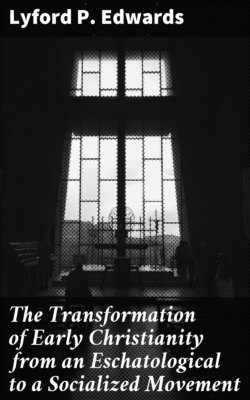The Transformation of Early Christianity from an Eschatological to a Socialized Movement

Реклама. ООО «ЛитРес», ИНН: 7719571260.
Оглавление
Lyford P. Edwards. The Transformation of Early Christianity from an Eschatological to a Socialized Movement
The Transformation of Early Christianity from an Eschatological to a Socialized Movement
Table of Contents
CHAPTER I
THE POLITICAL THEORIES OF THE EARLY CHRISTIANS
Footnote
CHAPTER II
THE EARLY CHURCH AND PROPERTY CONCEPTS
Footnote
CHAPTER III
THE EARLY CHURCH AND THE POPULACE
Footnote
CHAPTER IV
CHILIASM AND PATRIOTISM
Footnote
CHAPTER V
CHILIASM AND SOCIAL THEORY
Footnote
Отрывок из книги
Lyford P. Edwards
Published by Good Press, 2021
.....
Its association with Montanism brought Chiliasm into disrepute and suspicion with the Church hierarchy and it is not surprising that beginning with the last years of the second century we find a deliberate system of suppression adopted by certain ecclesiastical authorities—notably in Egypt. As we shall try to show later, the declension of Chiliasm can be only very imperfectly explained by official antagonism. But so far as this declension can be ascribed to individuals, the three great Alexandrian divines; Clement, Origen, and Dionysius have a prominent part. The influence of these men counted the more as it was consistently exercised in the same locality with increasing force during a period of more than half a century. The first of these writers, Clement (150-216 A.D.) does not specifically refer to the Chiliasts but there are a number of passages where he evidently has them in mind.[12] However the probability is that this very refraining from direct attack made his efforts the more successful. He emphasizes the fact that scriptural statements—particularly scriptural numbers—are not to be taken literally but are to be understood as of mystical significance. If Clement consciously aimed at the extirpation of Chiliasm (which is not absolutely certain) he at any rate took the most effective means for accomplishing that result. The great presupposition upon which Christian Chiliasm has been based is that of the literal interpretation of Scripture. By attacking that presupposition Clement caused the doctrine to be questioned by many persons whose attachment to Chiliasm would doubtless have only been strengthened by direct attack upon that tenet in particular. He prepared the way for the open and far more powerful attacks upon Chiliasm made by his great successor in the Catechetical School, Origen (185-254 A.D.). The position of this great theologian is the most equivocal of any writer who has attained eminence in Christian theology. How far anything he wrote is to be considered as orthodox is a most difficult matter to determine. The fact that Origen opposed Chiliasm, taken by itself, apart from the subsequent fate of the doctrine, could just as easily be made a commendation as a condemnation of that belief. Almost alone among Christian men Origen has been removed from the calendar of Catholic saints after having been duly received as a saint for the space of more than a hundred and fifty years. This unique fact, which is of course of far more importance for theology than for history, has nevertheless a bearing on our subject. The condemnation of Origen came too late to save the Chiliastic apologetic in the East but it very possibly may have had an indirect influence in the matter of continuing the repute of western Chiliasm.
Origen attacked Chiliasm in two vital points: First he insisted even more strongly than Clement upon the figurative or mystical or 'typical' interpretation of Scripture. In this regard he specifically quotes a number of Chiliastic passages of scripture and definitely says that their meaning is to be taken figuratively.[13] But more important than that, he definitely substitutes the theory of progressive development of the intellectual and spiritual element of man for the physical and sensuous earthly kingdom of the Chiliasts. This was certainly a great gain for the anti-Chiliastic theory which for the first time took a logical and comprehensible if a somewhat metaphysical form. However it must be admitted that the argument of Origen though wonderfully clear headed and almost miraculously modern[14] is too purely intellectual and cast in too philosophical a form to have any direct influence on ordinary individuals. It was doubtless quite in place in the Catechetical School and among scholars in the great centers of ancient learning but outside those limits its influence—at least directly—must have been very small. Nepos, an Egyptian bishop, answered Origen in a book entitled: "Refutation of Allegorists." This book is lost but we know that it was considered by the Chiliasts to be a work of the most powerful and indeed irrefutable sort. In the Arsinoite nome (on the west bank of the Nile south of Memphis) the Chiliastic doctrines were held by whole villages together and Dionysius the Great (Bishop of Alexandria 247-264 A.D.) found it necessary to visit this region and hold a public argument and instruction in order to avert a schism. By the tact and conciliatory attitude of the Bishop the Chiliasts were either won over to the non-Chiliastic view or at least expressed their gratification at the conference. It would appear, however, as if this synod or meeting was not sufficient to destroy the influence of Nepos' book so Dionysius wrote in refutation of it two books "On the Promises." Except for a few fragments these books have perished. We know merely that the first book contained a statement of the non-Chiliastic view and the second a detailed discussion of the Revelation in relation to Chiliasm and to the views of Nepos.
.....